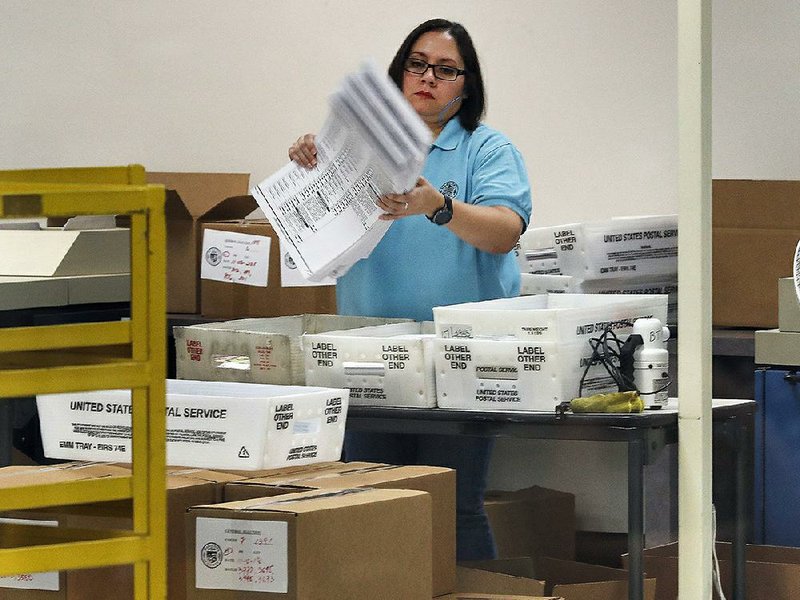ATLANTA -- Problem signs that arose during weeks of early voting carried into Election Day as some voters across the country faced hourslong lines, malfunctioning voting equipment and unexpectedly closed polling places.
Some of the biggest backups were in Georgia, where the governor's race was among the nation's most-watched midterm contests and was generating heavy turnout.
One voter in Gwinnett County, Ontaria Woods, waited more than three hours and said she saw about two dozen people who had arrived to vote leave because of the lines.
"We've been trying to tell them to wait, but people have children. People are getting hungry. People are tired," Woods said.
The good government group Common Cause blamed high turnout combined with too few voting machines, ballots and workers.
Fulton County elections director Richard Barron acknowledged that some precincts did have lines of voters but said that was because of the length of the ballots and voting machines taken from use because of an ongoing lawsuit.
Problems with casting ballots are a regular feature of Election Day, and making sense of the number of problems reported will take days and weeks. But the number of calls to voting hotlines maintained by a collection of advocacy groups quickly outpaced those received in the midterm election of 2014.
The Lawyers' Committee for Civil Rights Under Law, a nonprofit that oversees 20 election call centers, said that as of noon Tuesday, it had received close to 12,000 phone calls, more than double the volume four years ago.
Across New York City, reports of broken ballot scanners surfaced at several polling places. Turnout was so heavy at one packed precinct on Manhattan's Upper West Side that the line to scan ballots stretched around a junior high school gym. Poll workers there told voters that two of the roughly half-dozen scanners were malfunctioning and repairs were underway.
Voters arriving at two separate polling stations discovered that most scanners had broken down, forcing some people to drop their ballots in "emergency ballot boxes" or vote using affidavit ballots.
"There are broken scanners everywhere in Brooklyn," said Stefan Ringel, a spokesman for Brooklyn Borough President Eric Adams.
He said Adams and his staff were flooded with phone calls, emails and text messages reporting breakdowns in more than a dozen neighborhoods.
Compared with the 2016 elections, he said, "anecdotally, it seems worse, and there's confusion among poll workers about what to do."
Many voters nevertheless stuck it out, determined to cast their ballots.
"People are grumpy and frustrated but positive in a weird way, making jokes and talking to one another. I think it's because we all are in the 'no one will stop our vote today' mood,'" said Nikki Euell, an advertising producer who waited more than two hours to vote in Brooklyn's Greenpoint neighborhood.
The local breakdowns are a symptom of a larger problem with the nation's voting infrastructure, said Lawrence Norden, a voting technology expert with the Brennan Center.
More than 40 states use computerized voting machines that are more than a decade old or are no longer manufactured.
Elsewhere, polling place confusion caused problems for voters and poll workers.
In Phoenix, Ariz., a polling site was foreclosed on overnight. The owners of the property locked the doors, taking election officials by surprise. Voters had been sent to another precinct nearby, but Maricopa County Recorder Adrian Fontes tweeted that the location in Chandler was up and running shortly after 7 a.m. Tuesday.
There was also confusion in Allegheny County, Pa., which includes Pittsburgh, where at least four polling places were changed in the past two days.
In one Indiana county, voting was snarled for hours because of what election officials say were computer problems checking in voters while in another part of the state a judge ordered 12 polling places in a northwestern Indiana county to stay open late after voting didn't start as scheduled.
In Texas, home of a hotly contested U.S. Senate race, delays were reported in Houston after apparent issues with registration check-in machines at some polling places.
In South Carolina, a spokesman for the state Election Commission said problems with malfunctioning voting machines were far from pervasive and quickly addressed.
"These issues were attributable to human error in preparation of the system, and in most cases, were resolved earlier this morning," the spokesman, Chris Whitmire, said in an email. "We expect these types of isolated issues in any statewide election."
Tuesday's election marks the first nationwide voting since Russia targeted state election systems in the 2016 presidential race. Federal, state and local officials have been working to make the nation's myriad election systems more secure. They have beefed up their cybersecurity protections and improved communications and intelligence-sharing.
There have been no signs so far that Russia or any other foreign actor has tried to launch cyberattacks against voting systems in any state, according to federal authorities.
Information for this article was contributed by Christina A. Cassidy, Colleen Long, Michael Balsamo Frank Bajak, Thomas Davies, Verena Dobnik, Jennifer Peltz, Jennifer Kay and Ryan Tarinelli of The Associated Press; and by Danny Hakim, Alan Blinder and Michael Wines of The New York Times.
A Section on 11/07/2018

